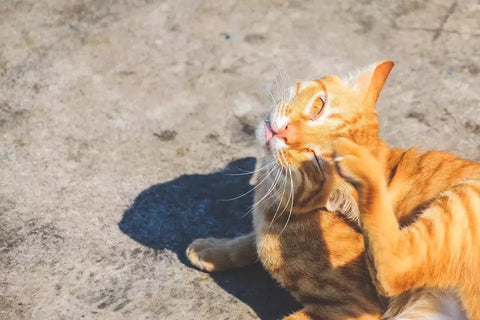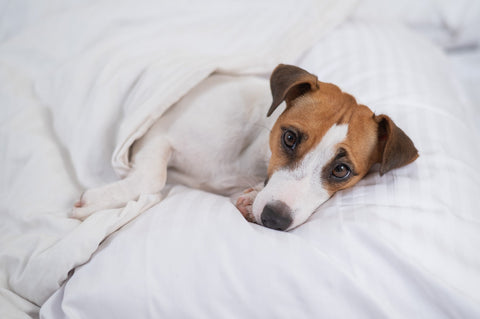Like people, dogs can and do experience gastrointestinal (GI) upset from time to time and/or chronic digestive disorders. These disorders affect the dog’s stomach and intestines resulting in discomfort for your dog and messy cleanups for you.
Dog GI Health – How to avoid messy cleanups
Optimal digestion is essential for your dog to use the nutrients from his food so he can have energy and repair his body. GI disorders reduce your dog’s body’s ability to digest and absorb their food properly. This in turn can lead to dehydration, electrolyte imbalances and malnutrition, which can lead to discomfort, as well. No one wants their baby to be uncomfy!
This can cause frustration and stress for both you and your fur-baby.
"GI disorders reduce your dog’s ability to digest and absorb food properly."
It’s important that you pay attention to your dog’s stool to determine if their GI tract is healthy or not (Oh, the things pet parents do!). If you see any signs that are concerning such as loose stools, mucous or bloody discharge, it’s incredibly important that you take your dog in to see your vet as soon as possible.
What Causes GI Upset in Dogs?
There are quite a few reasons for why your dog may be experiencing GI upset and your vet may want to run some tests to determine the exact cause, and to make sure that it is nothing too serious.
Main causes for GI distress can range from eating something other than food (getting into the garbage or rummaging through your cat’s litter box for treats, which we all know they love to do!), to food allergies/intolerance, lack of digestive enzymes or infections.
Some breeds seem to be more prone to GI trouble than others. Breeds like great Danes, German shepherds, collies and golden retrievers typically experience more digestive upset than other breeds.
Commonly diagnosed conditions include:
Acute Gastroenteritis
This refers to sudden inflammation or infection of the GI tract and is usually a short-term condition brought on by the dog eating something they shouldn’t have. Again, this could be because they have gotten into the garbage, or maybe they’ve eaten a foreign object, or toxic plants. It can also be caused by internal parasites, stress, and food allergies.
Colitis
By definition, Colitis is an acute or chronic inflammation of the membrane lining the colon (that can't feel good, am I right?).

This condition is typically caused by a parasite (whip worms are typically the culprit), polyps or tumors, a sudden change in diet, allergies (including those to food), and swallowed foreign objects.
Colitis is seen more in dogs under the age of five. Since the large intestine is inflamed, the result is frequent, painful passing of feces. Diarrhea may contain mucus and blood. This is something to be cautious of when taking care of your pup who is in his or her teens!
Pancreatitis
This refers to an infection or inflammation of the pancreas. That is the long, tapered gland that sits right behind the stomach. Vets aren’t exactly sure what causes this disorder, but they suspect feeding foods high in fat or rich table foods, infections, disease or trauma.
Small Intestinal Malabsorption
When the small intestine is inflamed, it becomes difficult, if not impossible, to absorb all of the necessary nutrients from food. This results in persistent diarrhea, weight loss and loss of appetite. None of the three are things we want to watch our babies suffer with.
Signs Your Dog May Have a Digestive Disorder
As we’ve mentioned, the most common symptom of GI upset is soft stools or diarrhea. But, dogs that suffer from digestive upset may also experience one or more of the following signs:
- Vomiting
- Regurgitation
- Flatulence
- Weakness
- Constipation
Chronic GI disease can be a debilitating problem for many dogs and requires testing and a thorough diagnosis from your veterinarian. It’s also important to mention that if your dog experiences chronic diarrhea or vomiting, they can become severely dehydrated. Should your dog be experiencing any of the signs above, consult your physician immediately!
How to Avoid Messes Around the House
When we have GI upset, it’s easy for us to get up and run to the bathroom, but it’s not always this easy for your dog. Particularly if you and your family members are away all day and your dog is inside without easy access to the backyard to relieve himself. Can you imagine having to do that? Umm, nope! However, we do have a solution.
While it may take some time to figure out what is going on with your four-legged pal and get their GI tract back in tip-top shape, you can fit them for a diaper which will keep your floors, rugs, and furniture from being ruined. Even the best enzymatic cleaners can’t get out those nasty stains from potty accidents that result from GI upset.
Pet Parents® doggy diapers come in a wide variety of sizes, so no matter if you have a chihuahua or a great Dane, you’ll be able to find the right size for your fur baby. Also, all of our dog diapers are machine washable, so you won’t have to waste money on diapers that will just end up in a landfill.
If you have any questions on how to fit your dog for a diaper so they stay on and so your dog is comfortable in them, give us a call. We’ll be more than happy to help!









